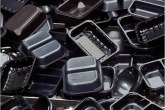Morrisons removes black plastic packaging
UK supermarket Morrisons has announced that it will be removing black plastic from all of its own brand food and drink packaging.
The supermarket will replace almost 4,000 tonnes of black plastic with a recyclable plastic containing at least 85 per cent recycled content, as part of the company’s aim for all packaging to be recyclable, reusable or compostable by 2025.

Natasha Cook, Packaging Manager at Morrisons, said: “It’s important to our customers that we make it easier to recycle plastic and so we are very pleased to announce that we’ve been able to eliminate black plastic from our own-brand products.”
Black plastic, which is often used for ready meal trays, yoghurt pots and shampoo bottles, poses particular problems at the sorting stage of the recycling process – the carbon black pigment absorbs the infra-red light used by optical sorting sensors at material recovery facilities (MRFs) and therefore can’t be detected. This means that black plastic ends up unsorted and can contaminate other material streams.
Read more: Plastic’s black sheep
Morrison’s decision to switch to plastic with 85 per cent recycled content would keep the packaging well above the threshold for the forthcoming plastics tax – the government has proposed to set a minimum level of 30 per cent recycled content for plastic packaging from April 2022.
However, such high recycled plastic content may not be suitable to pass the safety standards for food-grade packaging. This depends on the polymer used, as there is a current lack of infrastructure available to produce recycled polypropylene (the most common polymer used in food packaging) that is safely decontaminated and meets EU food packaging standards.
Supermarket action
As a member of the UK Plastics Pact, Morrisons has made a commitment to reducing its use of unnecessary single-use plastic to push for a circular economy for plastics. Other pact members have also targeted black plastic – according to a UK Plastics Pact progress report published in May, M&S is phasing out 1,700 tonnes of black plastic, while Lidl is removing all black plastic packaging from its primary fruit and vegetable packaging and Ocado has removed it from 83 product lines.
A report from the Black Plastic Packaging Recycling Forum, coordinated by plastics recycling charity RECOUP, forecast that the amount of black packaging coming to the market will be cut by 66 per cent by the end of 2019.
However, Sian Sutherland, co-founder of campaign group A Plastic Planet, believes that supermarkets need to do much more to reduce their use of plastic: “This announcement falls well short of the mark from what is needed. Packaging which contains recycled plastic content will not solve the crisis as plastic cannot be recycled infinitely. Unusable after being recycled once or twice, plastic will always make its way into the environment unless incinerated.
“What is needed now is real leadership in tackling the issue with an onus placed on reducing plastic packaging across the board. With plastic production forecast to quadruple in the next decade, we strongly urge Morrisons not to fall into the trap that we can recycle our way out of this problem. We can’t.
“Reduction is the only viable way to seriously combat this problem. We call for all supermarkets to focus on this and become real game-changers in the fight against plastic.”








